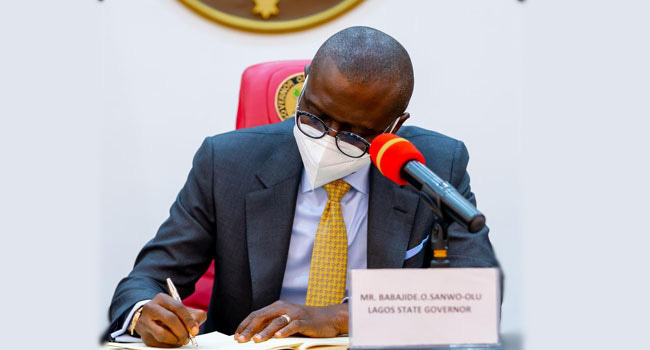Tuesday brief: Global stocks are falling. Here's why.
+ Lagos anti-grazing law & Sokoto's telecoms shutdown
* The Naira/Dollar rate was calculated by averaging buying rates from several Nigerian FinTech startups.
Good morning,
We are taking a peek into the topsy-turvy world of global finance, Sanwo-Olu’s assent to an open-grazing bill, and why Sokoto is shutting down telecom services.
Global stocks are falling. Here's why.
Investors across the world are being spooked as mammoth Chinese company Evergrande struggles to meet its obligations to investors.
The S&P 500, which tracks the performance of 500 large companies listed on stock exchanges in the United States, fell 1.7 percent on Monday, marking its worst day of trading since May.
The technology-heavy Nasdaq also slid 2.2 percent and the CBOE Volatility index, known as Wall Street’s ‘fear gauge’, hit a high of 28.8 — its highest level since May.
The Stoxx 600, an index of European stocks, ended short by 1.7 percent.
Hong Kong’s Hang Seng index closed at 24,099 points, its lowest level since October last year and its property index was down almost seven percent to its lowest point since 2016.
The stock of one Chinese developer was down 87 percent before trading was suspended.
Although the Nigerian Stock Exchange didn’t record any significant movement, Evergrande’s troubles are worth paying attention to considering Nigeria’s economic exposure to Chinese goods and loans.
Evergrande’s default in itself may not be fatal, but markets thrive on perception as much as hard numbers and the domino effect could be devastating for the Chinese and, by extension, global economy. For example, despite announcing that it held no exposure to Evergrande debt or equity, shares in China’s biggest insurer fell as much as 8.4 percent on Monday.
Related: Cryptocurrency prices were not spared the Evergrande contagion. Bitcoin on Monday was down by as much as 10.7 percent to push it below $43,000, its lowest level since the start of August.
Lagos enacts anti-grazing legislation
Governor Babajide Sanwo-Olu on Monday signed into law a bill prohibiting open grazing in Lagos state.
The new law makes it criminal for cattle rearers to occupy unapproved public areas and private land for grazing.
It also prohibits the movement of cattle around public places.
However, it remains to be seen how the state will implement the law.
Other southern states, including Ondo, have passed similar laws recently.
The ban on open grazing is seen as a solution to the perennial farmer-herder conflict that has claimed many lives across the country.
Abdullahi Sule: The Nasarawa State Governor believes rather than banning open grazing, governments should provide better alternatives to herders.
Sokoto shuts down telecom services
As part of its efforts against banditry, the Sokoto State government has shut down telecommunication networks in 14 of its 23 Local Government Areas.
Similar measures have been taken in neigbouring Zamfara and Katsina State.
According to Governor Aminu Tambuwal, the shut down of telecom services, accompanied by an offensive military operation, has been effective in both Zamfara and Katsina, forcing the bandits to flee towards Sokoto.
Terrorism: The Presidency says it is not interested in naming and shaming sponsors of terror and is instead focused on bringing perpetrators to justice.
Related: The United Nations High Commissioner for Refugees (UNHCR) has warned that it is not yet safe to fully relocate refugees and Internally Displaced Persons to their homeland in Borno State.
What else is happening?
INEC: The election body says over one million Nigerians have completed their physical registration in the ongoing nationwide continuous voter registration.
Border patrol: The Nigeria Customs Service says it will soon deploy drones at the Seme border to check smuggling activities.
Inuwa Yahaya: The Gombe State Governor believes if Lagos and Rivers succeed in holding on to their VAT revenues, his state will struggle to pay salaries.
Edwin Clark: The Ijaw leader has criticised the Navy over its decision to establish a base in Kano State.
Industrial action: Nurses in Lagos State have threatened to go on strike over improved welfare conditions and unpaid bonuses.
EFCC: The anti-crime agency says it has arrested 30 suspected cyber fraudsters in a sting operation at the Kwara State University.
Cholera: Bauchi, Katsina, and Borno recorded the most cases of the contagious disease within a period of one week in September, according to the Nigeria Centre for Disease Control.
And that’s it for today. See you tomorrow.







